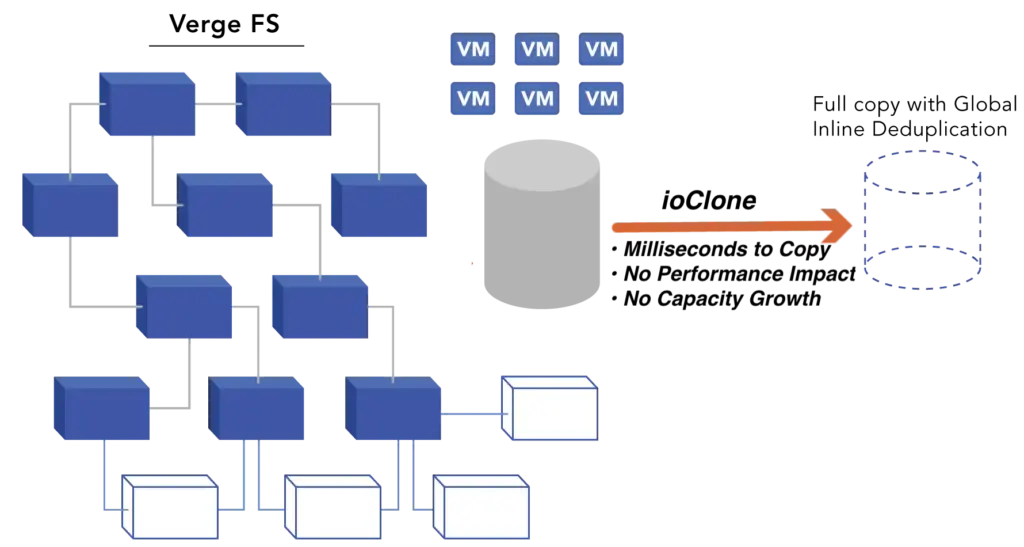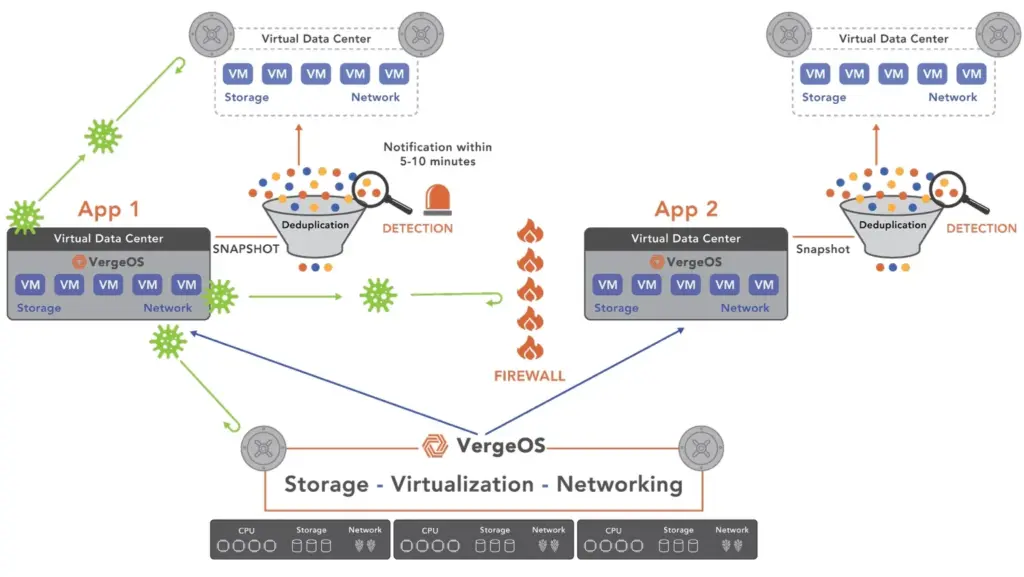While you are looking to break away from high VMware licensing fees, why not declare your backup independence? For decades, enterprise data protection strategies have relied on a layered architecture, where production workloads run on a hypervisor, are protected by third-party backup software, and are optionally replicated to a secondary site. This architecture, while functional, introduces unnecessary complexity, high operational overhead, and escalating backup licensing costs.
VergeOS presents an alternative approach. It is a hypervisor replacement for platforms such as VMware, Hyper-V, or Nutanix, integrating native data protection capabilities that eliminate the need for separate backup and disaster recovery (DR) infrastructure. For organizations transitioning to a virtualization alternative, VergeOS provides an opportunity to modernize their entire data protection stack. The result doubles your return on investment while increasing your availability and resiliency.
This article outlines how VergeOS, through its integrated technologies—ioClone, ioGuardian, ioReplicate, and Virtual Data Centers (VDCs)—provides an architectural foundation that can, in many cases, supplant conventional backup software, allowing you to declare your backup independence.
Integrated Data Protection via ioClone Snapshots
Traditional backup workflows rely on scheduled jobs to create point-in-time copies of data, at significant performance and storage cost. VergeOS eliminates the need for this workflow through ioClone, its native snapshot mechanism. Independent, unlimited snapshots are the foundation of backup independence.
ioClone snapshots are:

These characteristics enable backup independence with snapshots taken at high frequency and retained over long periods without degrading performance or consuming excessive storage.
With ioClone-powered snapshots, customers can restore individual files, entire virtual machines, or complete virtual data centers directly from ioClone snapshots, dramatically simplifying recovery workflows.
Please register for our hands-on lab to explore snapshot creation, rollback, and recovery operations in a live VergeOS environment.
Integrated Data Availability via ioGuardian
While ioClone addresses point-in-time recovery, ioGuardian introduces a different dimension: fault tolerance through a regularly updated third copy of production data, taking backup independence to a new level.

Each time an ioClone snapshot is taken, ioGuardian synchronizes a copy of the underlying data structures into a reserved, isolated hardware domain outside the primary instance of VergeOS. In the event of a severe infrastructure-level failure—such as the simultaneous failure of multiple drives or nodes—VergeOS can dynamically reference this ioGuardian copy to access the blocks of data that the affected virtual data centers or virtual machines require to remain operational. It is data protection that goes beyond even a three-way mirror.
This capability is not merely for recovery—it is designed to prevent disruption. Where RAID and mirrored data stores might fail under dual-disk or multi-node failure conditions, VergeOS with ioGuardian continues to serve the environment in real time by reconstructing missing data from the third copy.
Key distinctions include:
- Granular Access: ioGuardian enables block-level access to data, allowing for precise and efficient recovery.
- Continuous Update Model: It is not a passive backup but a frequently updated replica, aligned with the latest ioClone snapshot.
- Beyond Mirroring: ioGuardian introduces a level of redundancy that extends beyond conventional two- and three-way mirrors, offering an additional layer of protection when traditional methods would fail.
Integrated Data Replication via ioReplicate

Backup independence mandates off-site retention and disaster recovery. VergeOS includes ioReplicate, a native VM- and VDC-level replication engine. Organizations can define policies to replicate workloads to another VergeOS instance, whether on-premises or geographically remote.
ioReplicate Delivers:
- Scheduled or Real-Time Replication: Configurable to meet varied RPO/RTO requirements.
- Bandwidth Management: Integrated controls allow replication traffic to be rate-limited or scheduled during non-peak hours.
- Application-Consistent Snapshots: With proper guest configuration, VergeOS can generate consistent snapshots for replicated workloads.
Unlike traditional DR workflows, which often involve external replication appliances or orchestration software, VergeOS performs these operations within a single, integrated platform, reducing points of failure and operational complexity.
Virtual Data Centers for Logical Isolation and DR Testing
Further solidifying backup independence are Virtual Data Centers (VDCs), a powerful feature in VergeOS. VDCs offer logical segmentation of compute, storage, and networking resources within a single VergeOS environment.
Use cases include:
- DR Simulation: Replicated VDCs can be brought online for non-disruptive recovery testing.
- Sandboxing: Snapshots of production VDCs can be cloned into isolated test environments for development or security analysis.
- Regulatory Compliance: Logical boundaries help support data sovereignty and multi-tenant isolation requirements.
- Limiting Ransomware Exposure: If ransomware infiltrates your environment, VDCs mitigate its impact. It can’t spread to other VDCs. Then you can use our ioFortify capabilities to identify and rapidly recover from the attack.

The VDC capability simplifies DR planning, allowing organizations to mirror, test, and failover entire segments of their infrastructure without duplicating physical resources or integrating external orchestration frameworks.
For these cases, VergeOS supports both agentless and agent-based backup strategies and can coexist with other products.
A New Interpretation of 3-2-1
VergeOS supports a modernized interpretation of the classic 3-2-1 rule for data protection:
- 3 copies: Primary production VM, multiple ioClone read-only snapshots and ioGuardian third-copy layer on-premises.
- 2 locations: Primary site and remote VergeOS instance via ioReplicate plus remote ioGuardian copy.
- 1 platform: All functions—virtualization, data protection, and DR—managed within a single codebase, VergeOS.
VergeOS eliminates the need for:
- External backup agents and proxies
- Snapshot-to-backup translation layers
- Separate orchestration or DR automation products
- Separate backup licensing and storage costs
The result is a simplified and backup-independent alternative to VMware.
Evaluating the Claim
Skeptics are right to challenge assertions of backup independence, but replacing, or at least reducing dependency on backup is a common theme in our customer case studies. Organizations replacing VMware, Hyper-V, or Nutanix should not default to replicating their legacy backup environments. Instead, they should evaluate how a platform like VergeOS redefines the boundary between production and protection.
To Learn More
If your organization is planning an infrastructure refresh—whether driven by changes to virtualization platforms, disaster recovery requirements, or a desire to declare backup independence—VergeOS offers a unified, forward-looking solution.
Schedule a session with one of our data protection experts to evaluate your current architecture and explore how VergeOS can support a seamless VMware exit while redefining the boundary between production and protection. In many cases, it may also enable you to eliminate your dependency on legacy backup software.


